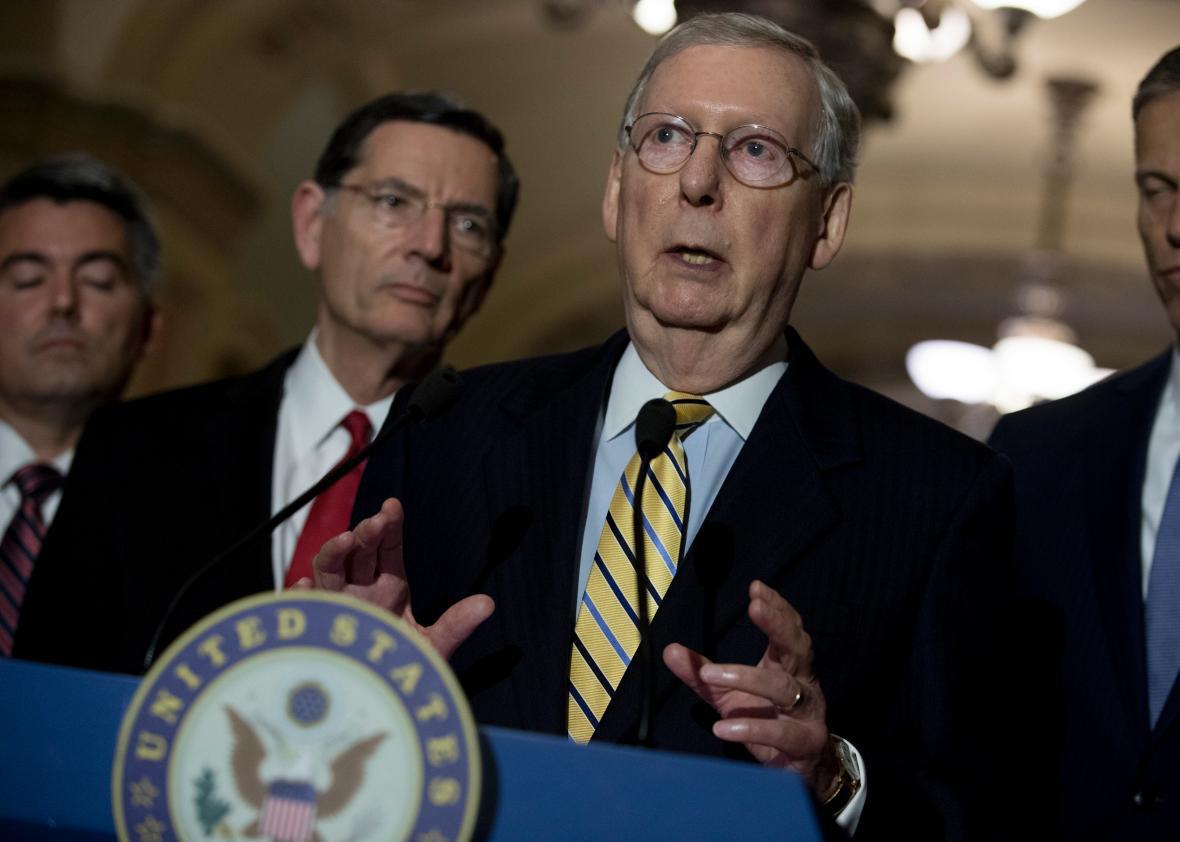Senate Republicans want you to know they’ll be writing a health care bill from scratch. A very Senate-y bill that accords with the noble traditions of their chamber, and not a greasy pauper’s stack of health-related banshee screams like the House-passed American Health Care Act. To amend a House bill would be beneath them. It is time, now, for the gentry of Capitol Hill to write a proper bill.
So … what’s going to be in it?
Getting that question answered on Monday afternoon, as senators returned from the weekend, proved extremely difficult. One by one they would step off the Senate subway at the Capitol and trot to the elevator, working as diligently as possible not to give reporters a clue. They either didn’t want to commit to anything, have no real structural problems with the House bill, or just never thought they’d be in this situation after the first House bill flamed out in March. If they knew what sort of health care bill they wanted to write, maybe they already would have started writing it. Instead, the Senate’s 13-person health care “working group” will meet Tuesday to figure out what the hell they are going to do. Also, the senators who are not in the working group will be meeting to figure out what the hell they are going to do. Everyone is meeting with everyone else to discuss very non-House ideas, which, whenever they have them, are certain to be championed by the American people.
Few senators seemed to have much of a problem with the architecture of the House bill. When I asked Georgia Sen. David Perdue what had to go from the House bill, he said, “I don’t know that I would characterize anything as ‘having to go.’ ” He instead talked in terms of adjustments, like making the “high-risk pools potentially larger.”
North Carolina Sen. Thom Tillis, who described himself as “not a blank-sheet-of-paper sort of person,” said that “the House bill should definitely be instructive in everything we do.”
When a reporter asked South Carolina Sen. Tim Scott whether his party had underestimated the popularity of pre-existing condition protections under the Affordable Care Act, he said “no … that’s why you see it in the health care start in the House.”
And a practically sprinting Wyoming Sen. John Barrasso, who insisted that he wanted to make sure those with pre-existing conditions were protected under Senate legislation, said he thinks the House bill already does an adequate job of that. “I believe it does,” he said, “and I want to make sure that people feel” the same way.
Among those “people” who may not feel the same way is Alaska Sen. Lisa Murkowski. When I asked her whether the House bill adequately protects those with pre-existing conditions, she said simply, “I don’t know.” But what does she want to do differently? What about any Senate Republican? They will be having discussions.
Several senators, including West Virginia Sen. Shelley Moore Capito and North Dakota Sen. John Hoeven, want to revisit the severity of the House bill’s Medicaid cut and reformulate the bill’s refundable tax credits—i.e., make them at least marginally worthwhile to lower-income seniors. They also want to do something to reassure those “people” concerned about the House bill’s treatment of those with pre-existing conditions. In other words, the discussion will be over adjustments to an existing legislative structure.
Senators said that their central measure of success, in whatever they write, is lower premiums. That’s where things get murky as they try to differentiate their bill from the House’s. The idea behind the amended AHCA is to lower average premiums by eliminating coverage regulations, leaving those with expensive pre-existing conditions to fend for their lives in questionably funded high-risk pools. What better conservative idea do the lords of the Senate Republican caucus have?
I suspect they’re not sure. All they know is that the American Health Care Act is a toxic product, they didn’t think they’d have to deal with this anymore, and they’re determined to at least create the impression that they’re starting from scratch. Suggestions welcome.
